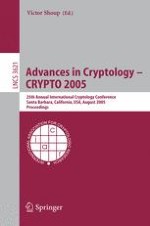2005 | OriginalPaper | Buchkapitel
On Codes, Matroids and Secure Multi-party Computation from Linear Secret Sharing Schemes
verfasst von : Ronald Cramer, Vanesa Daza, Ignacio Gracia, Jorge Jiménez Urroz, Gregor Leander, Jaume Martí-Farré, Carles Padró
Erschienen in: Advances in Cryptology – CRYPTO 2005
Verlag: Springer Berlin Heidelberg
Aktivieren Sie unsere intelligente Suche, um passende Fachinhalte oder Patente zu finden.
Wählen Sie Textabschnitte aus um mit Künstlicher Intelligenz passenden Patente zu finden. powered by
Markieren Sie Textabschnitte, um KI-gestützt weitere passende Inhalte zu finden. powered by
Error correcting codes and matroids have been widely used in the study of ordinary secret sharing schemes. In this paper, we study the connections between codes, matroids and a special class of secret sharing schemes, namely multiplicative linear secret sharing schemes. Such schemes are known to enable multi-party computation protocols secure against general (non-threshold) adversaries.
Two open problems related to the complexity of multiplicative LSSSs are considered in this paper.
The first one deals with strongly multiplicative LSSSs. As opposed to the case of multiplicative LSSSs, it is not known whether there is an efficient method to transform an LSSS into a strongly multiplicative LSSS for the same access structure with a polynomial increase of the complexity. We prove a property of strongly multiplicative LSSSs that could be useful in solving this problem. Namely, using a suitable generalization of the well-known Berlekamp-Welch decoder, we show that all strongly multiplicative LSSSs enable efficient reconstruction of a shared secret in the presence of malicious faults.
The second one is to characterize the access structures of ideal multiplicative LSSSs. Specifically, we wonder whether all self-dual vector space access structures are in this situation. By the aforementioned connection, this in fact constitutes an open problem about matroid theory, since it can be re-stated in terms of representability of identically self-dual matroids by self-dual codes. We introduce a new concept, the flat-partition, that provides a useful classification of identically self-dual matroids. Uniform identically self-dual matroids, which are known to be representable by self-dual codes, form one of the classes. We prove that this property also holds for the family of matroids that, in a natural way, is the next class in the above classification: the identically self-dual bipartite matroids.
